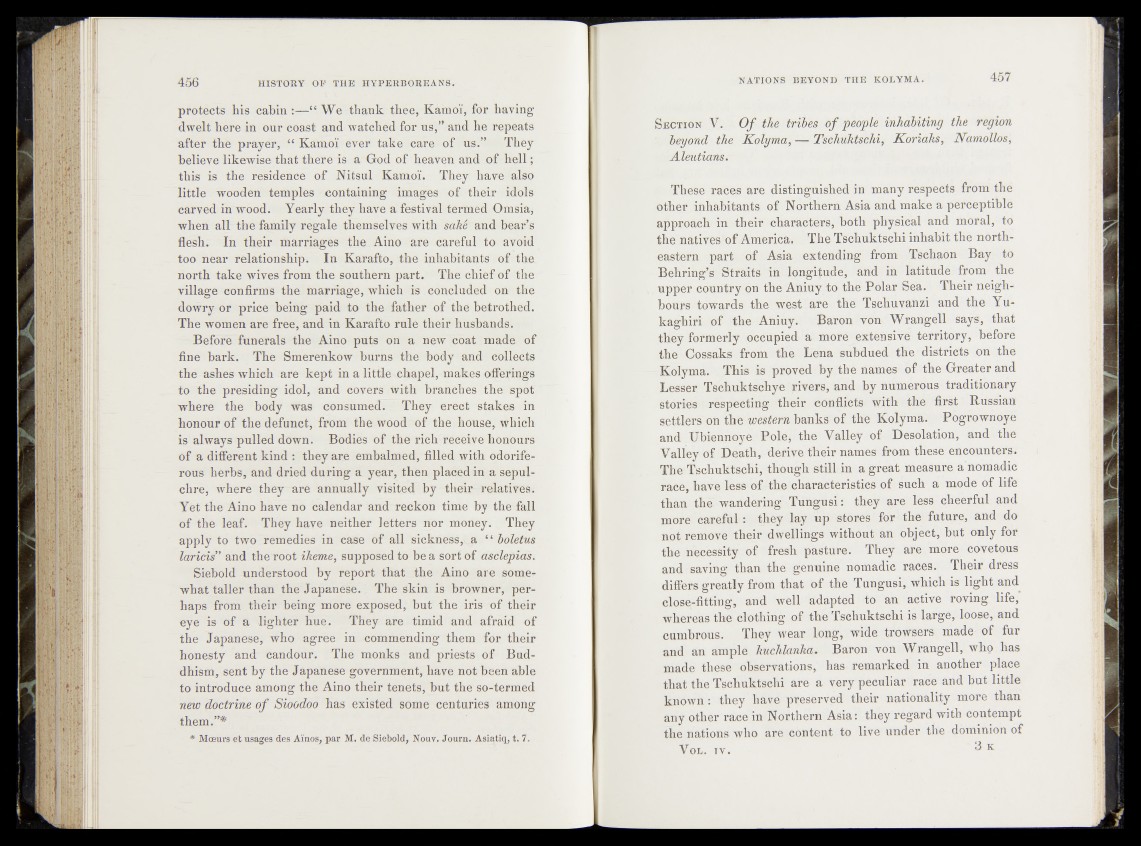
protects his cabin :—“ We thank thée, Kamoï, for having
dwelt here in our coast and watched for us,” and he repeats
after the prayer, “ Kamoï ever take care of us.” They
believe likewise that there is a God of heaven and of hell ;
this is the residence of Nitsul Kamoï. They have also
little wooden temples containing images of their idols
carved in wood. Yearly they have a festival termed Omsia,
when all the family regale themselves with saM and bear’s
flesh. In their marriages the. Aino are careful to avoid
too near relationship. In Karafto, the inhabitants of the
north take wives from the southern part. The chief of the
village confirms the marriage, which is concluded on the
dowry or price being paid to the father of the betrothed.
The women are free, and in Karafto rule their husbands.
Before funerals the Aino puts on a new coat made of
fine bark. The Smerenkow burns thebody and collects
the ashes which are kept in a little chapel, makes offerings
to the presiding idol, and covers with branches the spot
where the body was consumed. They erect stakes in
honour of the defunct, from the wood of the htipsé, which
is always pulled down. Bodies of the rich receive^honours
of a different kind : they are embalmed, filled with odoriferous
herbs, and dried during a year, then placed in a sepulchre,
where they "are annually visited by their- relatives.
Yet the Aino have no calendar and reckon time by the fall
of the leaf. They have neither letters nor money. , They
apply to two remedies in case of all sickness,va “ boletus
lands' and the root ikeme, supposed to be a sort of asclepias.
Siebold understood by report that the Aino are somewhat
taller than the Japanese. ' The skin is browner, perhaps
from their being more exposed, but the iris of their
eye is of a lighter hue. They are timid and afraid of
the Japanese, who agree in commending them for their
honesty and candour. The monks and priests of Buddhism,
sent by the Japanese government, have not been able
to introduce among the Aino their tenets, but the so-termed
new doctrine of Sioodoo has existed some centuries among
them.”*
* Moeurs et usages des Aïnos, par M. de Siebold, Nouv. Journ. Asiatiq, t. 7.
S ection V.j Of the tribes of people inhabiting the region
’ beyond the Kolyma, — Tschuktschi, Koriahs, Namollos,
Aleutians.
These races are distinguished in many respects from the
other inhabitants/ of Northern Asia and make a perceptible
approach învtheir characters, both physical and moral,' to
the natives of America. The Tschuktschi inhabit the northeastern
part of Asia extending from Tschaon Bay to
Behring’s Straits in longi|û^e, and in latitude from the
upper country on the Aniuytó the Polar Seâ. Their neighbours
towards the west are the Tschuvanzi • and the Yu-
kaghiri of the Aniuy. Baron von WrangpL^Says, that
they formerly occupied a more Extensive territory, before
the Cossaks from the Lena subdued the districts on the
Kolyma. This is proved by the names of the Greater and
Lesser,, Tschuktsehye rivers, and by numerous- traditionary
stories■ respecting their conflicts with the first Russian
settlers'on Ûïewestern banks of the Kolyma. Pogrownoÿe
and Ubiennoye Pole, the Valley of Desolation, and the
Valley of Death, derive their names’ from th e e ë n counters.
The Tschuktschi, though still-in a. great îâeasur,é/a'nomadic
race, have less of the characteristics of such a mode of life
than the wandering Tungusi : they are less cheerful and
more careful : they lay up stores for the* future, and do
not remove their dwellings without an objefct^but only for
the necessity of fresh pasture. They are more covetous
and saving than thé -genuine nomadic races. Their dress
differs greatly from that of the Tungusi, which is light and^
close-fitting, and well adapted : to an active roving life,'
whereas the clothing of the Tschuktsehiis large, loose, and
cumbrous. They wear long, wide tréwSers made of fur
and an ample kuchlanka. Baron von Wrangell, who has
made thèse observations, has remarked in another place
that the Tschuktschi are a very peculiar race and but little
known : they have -preserved their nationality more than
any other race in Northern Asia: they regard with Contempt
the nations who are content to live under the dominion of
vol. iv . iliii 3 K